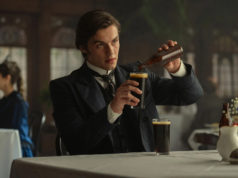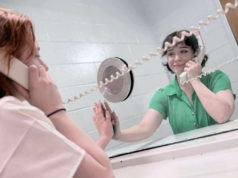This is how big a Whit Stillman fan I am: I saw his Metropolitan as a teenager. (Weirdly enough, it was broadcast on local TV while it was running in theaters in New York.) I was so taken with the movie and its teenage heroine, Audrey Rouget, that eight years later, when I saw Audrey suddenly surface for a cameo appearance in Stillman’s The Last Days of Disco, I almost shouted out to her. I felt like I had unexpectedly run into an old friend.
With that in mind, you can imagine how psyched I was last year when I found out that Stillman had finally gotten his fourth movie underway, called Damsels in Distress. He had spent the entire 2000s out of commission, trying and failing to get various film projects made, and I was beginning to think I’d never get the chance to write about him. When I found out that Damsels would have musical numbers, I figured this would be a large slice of movie heaven. Well, it isn’t, but it’s still an interesting viewing experience that’s out on DVD this week, so it’ll make for a nice bit of counterprogramming when everybody else is renting The Avengers.
Damsels takes place at a fictitious college, where a trio of upperclassmen named Violet, Rose, and Heather (Greta Gerwig, Megalyn Echikunwoke, and Carrie MacLemore) are trying to reform the previously all-male school by using good hygiene and tap dance classes to cure depression and various mental ailments. Someone in the school’s administration must like to play with fire, because these girls have been put in charge of the suicide hotline. “You know that old cliché that prevention is nine-tenths of the cure?” says Violet. “With suicide, it’s more like ten-tenths.” Their efforts are seen through the eyes of Lily (Analeigh Tipton), a sophomore transfer student who becomes their latest recruit.
If you’ve spotted that all these girls have floral names, that’s not an accident. Stillman’s writing, which has always been a bulwark of his filmmaking, is here far more stylized than in any of his previous films. In Metropolitan, Barcelona, and The Last Days of Disco, he was making at least a token effort to capture the hyperliterate way that his upper-class New York WASP characters spoke. In Damsels, he’s making no attempt at realism. These girls and their fellow students speak in exquisitely turned phrases peppered with subordinate clauses and qualifiers such as “in point of fact” and “furthermore.” In this, he’s trying to evoke Hollywood comedies of the 1930s and ’40s, especially the films of Preston Sturges, who thought nothing of having uneducated characters break out polysyllabic words in casual conversation. (The Coen brothers are also heavily influenced by Sturges. They do this, too, especially in The Hudsucker Proxy and O Brother, Where Art Thou?) The title Damsels in Distress refers to A Damsel in Distress, a 1937 musical with Fred Astaire, George Burns, Gracie Allen, and an in-over-her-head Joan Fontaine. Stillman includes a character named Freak Astaire and stages the climactic dance number to “Things Are Looking Up,” a song written by George and Ira Gershwin for the 1937 film.
None of this is a problem with the movie; what is the problem is Violet. She’s not a typical Stillman heroine. His sympathies are always with the shy, quiet girl in the corner who reads a lot and slowly forms penetrating observations about people’s natures. When a character like that isn’t holding the center of his movies, Stillman gets into trouble. (Barcelona is the weakest of his movies in my estimation, and it’s the only one of his where the main characters are men.) Despite her name, Violet is no shrinker. She’s a well-intentioned, cheerful busybody who thinks she knows what’s best for everyone. When the main character is like this, there’s generally two ways the story goes. One is that the busybody gets a reality check and is made to confront her own fallibility (the Clueless ending). The other is that she’s in a magically protected bubble and continues to go around dispensing advice and bringing sunshine into everybody’s lives (the Legally Blonde ending). You sort of wish Violet would get the reality check, especially after a scene when Violet defends the fraternities against a charge of elitism by saying that the frat boys are a bunch of illiterate, socially inept mouth-breathers who aren’t elite in any sense and deserve our pity and our help. Sometimes, a defense is actually an attack. Anyway, Stillman can’t make up his mind over which conclusion to go with, and his movie is a mess as a result.
Stillman’s two best movies are available on Criterion Collection DVDs, and they’re both tremendous. Metropolitan feels like a relic from another time, like something you would have gotten if you’d given Jane Austen a camera and turned her loose in 1970s upper-crust Manhattan. That’s not a bad thing, in this instance. It gives the movie a timeless quality. The director captured the opulence of the setting while keeping filming expenses down. One way he did that was by waiting outside debutante parties that were about to let out, and having actors perform their scenes while mingling with the young socialites who were exiting. The movie won Stillman an Oscar nomination for his script, an unusual honor for a low-budget movie with no stars and not even an Oscar push from a studio used to handling such things for independent films. (Then again, the screenwriters who vote on the writing Oscars have always had better taste than the Oscar voters at large.) Stillman’s authorial voice is already well-established in his first film, as you can hear in an early exchange about Fourier and Brook Farm. That teenage heroine is Audrey Rouget (Carolyn Farina), a girl who has read all of Austen’s novels and bursts into tears during a midnight Mass service at Christmas. She’s an insecure teenager in many ways, but you just know that once she grows up, she’s going to kick all kinds of ass. Whatever happened to Carolyn Farina, anyway? Aside from Stillman’s films, the only other movie role she’s taken on has been as Daniel Day-Lewis’ sister in Scorsese’s The Age of Innocence. What has she been up to in the meantime?
The Last Days of Disco has some uncanny parallels with Damsels in Distress; both Violet and Disco’s Charlotte (Kate Beckinsale) think they’ve figured out everything, though Charlotte is a much more poisonous person. Stillman has always been a huge Jane Austen fan; if Damsels is his Emma, The Last Days of Disco is his Mansfield Park, a story of a girl who discovers that her best friend is someone she needs to get away from. Charlotte is the sort of person who tells you that everyone hated you in high school and then expects credit for her honesty. What makes her so dangerous is that, she truly believes she’s being a good friend by doing this. This is still Beckinsale’s greatest-ever performance, playing a narcissistic piece of work, and the acting here overall is better than in any other Stillman film. This, plus a joyous final shot, helps make The Last Days of Disco his best movie, even if Metropolitan is my personal favorite. If you ever hear someone saying Saving Private Ryan should have beaten Shakespeare in Love for the 1998 Best Picture Oscar, tell them that The Last Days of Disco was the best movie of that year. You’ll blow their minds, and you might even be right.
Check out Troy Patterson’s stellar free-associative riff on Slate about Stillman, Sex and the City, Katie Roiphe, and Lena Dunham’s Girls. He makes reference to the fact that Dunham is a huge Stillman fan. Whether Stillman returns the appreciation is up in the air; apparently he asked Dunham to be in Damsels and then called her some names in public when she declined. He did the same to Chris Eigeman, an actor who had major roles in all three of Stillman’s previous films, and whose prep-school snottiness was always good for some huge laughs. Was Stillman joking? Or did we just get a glimpse of why he was inactive for 14 years? In any event, some other Stillman regulars did show up in Damsels: Farina is a waitress in a diner (whose name is specified so that we know she’s not Audrey Rouget) and Taylor Nichols plays a professor who shares a surname with the character Nichols played in Metropolitan.
Speaking of Dunham, the whole “Is this show too white?” debate that cropped up around Girls might have reappeared for Stillman’s films, except that Damsels has two black characters. His previous movies were indeed all-Caucasian affairs, and all-hetero affairs as well, which is particularly impressive given that The Last Days of Disco is set in the world of disco. The phrase “honest whiteness” emerged in the Girls discussion, referring to pieces of entertainment that don’t pretend to know what life is like from a nonwhite point of view, and so don’t try to depict it, focusing instead on the problems (which are worth addressing) that face middle-to-upper-class white people. I tend to prefer a film that does this to a film that strains itself trying to include some token nonwhite character (or worse, lapses into stereotype). On the other hand, even Whit Stillman surely knows that college campuses aren’t all-white enclaves. The only black character with any sort of depth is Rose, who acts as a skeptical counterpoint to the optimistic Violet, and who knows about Violet’s mentally troubled past. Rose also speaks with a British accent that is strongly hinted to be a put-on. Will we see more characters of color in future Stillman films, and will they ring true? The situation will be monitored.
And am I the only one who thinks Stillman has a lot in common with Kevin Smith? They both share a Catholic sensibility, characters who recur in multiple films, and a fondness for garrulous types who develop complicated theories about how the world works. (We could also add that they both peaked in the 1990s, though I hold out hope for both of them.) Of course, Smith’s movies have much more Star Wars references and sex jokes, though I’m sure he’d be green with envy at the subplot in Damsels in which Lily’s arrogant jerk of a French boyfriend (Hugo Becker) gets her to have anal sex with him because his religious beliefs prevent him from engaging in any other type of sex. If you’re wondering, “Which religion is this?”, the dude calls himself a Cathar, and his beliefs stem from a common misconception spread by the Catholic Church about the medieval religious sect. Over some other bit of received “wisdom” from the guy, Lily says, “The Catholics are always bad, aren’t they?” This is a joke; Catholic themes run through all of Stillman’s films. Here’s what’s bugging me: What does Analeigh Tipton think of this? If my first name were spelled the way hers is, I think I’d avoid portraying characters who have anal sex.
Anyway, Damsels suffers from bland male characters and a pointless subplot about a college guy who doesn’t know the names of colors. Yet the cast is appealing (if sometimes overwhelmed by the dialogue’s demands), and there are still some sparkling bits of verbiage like Violet’s disquisition on the importance of clichés and hackneyed expressions and an elaborate conversation on the meaning of sending drinks to strangers in bars. It’s all enough to make me hope for another Stillman comedy, one that doesn’t take 14 more years to reach us. Maybe I’ll see Audrey Rouget again.












